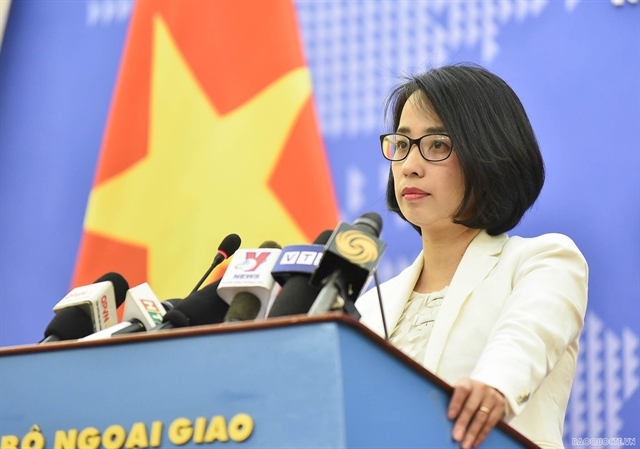 Politics & Law
Politics & Law

Việt Nam on Thursday demanded China withdraw survey ship Xiang Yang Hong 10 and the escorting flotilla of coast guard vessels and fishing vessels from Vietnamese waters.

|
| Deputy spokesperson for the Vietnamese Ministry of Foreign Affairs Phạm Thu Hằng. — Photo from the Ministry of Foreign Affairs |
HÀ NỘI — Việt Nam on Thursday demanded China withdraw the survey ship Xiang Yang Hong 10 and its escorting flotilla of coast guard and fishing vessels from Vietnamese waters.
Deputy spokesperson for the Vietnamese Ministry of Foreign Affairs Phạm Thu Hằng made the remark in response to a reporter's question on Việt Nam's reaction to recent Chinese intrusion by Chinese vessels into Việt Nam's exclusive economic zone (EEZ) in the East Sea (known internationally as the South China Sea).
"As previously reported, the Chinese survey ship Xiang Yang Hong 10, along with a number of accompanying coast guard and fishing vessels, has violated Việt Nam's EEZ, which was established in accordance with the provisions of the 1982 United Nations Convention on the Law of the Sea 1982," Hằng said.
The Vietnamese Ministry of Foreign Affairs and relevant agencies have repeatedly communicated with Chinese authorities and implemented measures in accordance with international law and Vietnamese law to ensure Việt Nam's legitimate rights and interests, the deputy spokesperson stressed.
Việt Nam demands that relevant Chinese agencies comply with the common perceptions of the high-level leadership of the two countries, immediately end their provocative activities, withdraw the Xiang Yang Hong 10 and other coast guard and fishing vessels from Vietnamese waters, respect Việt Nam's sovereignty and jurisdictional rights, strictly abide by the Declaration on the Conduct (DOC) of Parties in the South China Sea, towards the maintenance of peace, cooperation, and development in the East Sea, and contribute to the development of bilateral relations.
Earlier last week, at the 20th ASEAN-China Senior Officials' Meeting on the Implementation of the DOC held in the northern province of Quảng Ninh of Việt Nam, Ambassador Vũ Hồ, Acting Head of ASEAN SOM Việt Nam, said that given the complex situation and ongoing unilateral actions that violate international law in the East Sea, the ambassador suggested that countries should combine "words with deeds" by translating political commitments into specific and appropriate actions in the field.
In such spirit, he highlighted the need to use international law and the 1982 United Nations Convention on the Law of the Sea (UNCLOS) as a 'lodestar' for activities in the East Sea. — VNS




